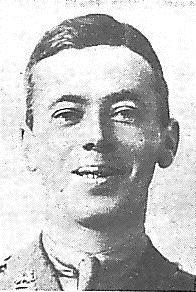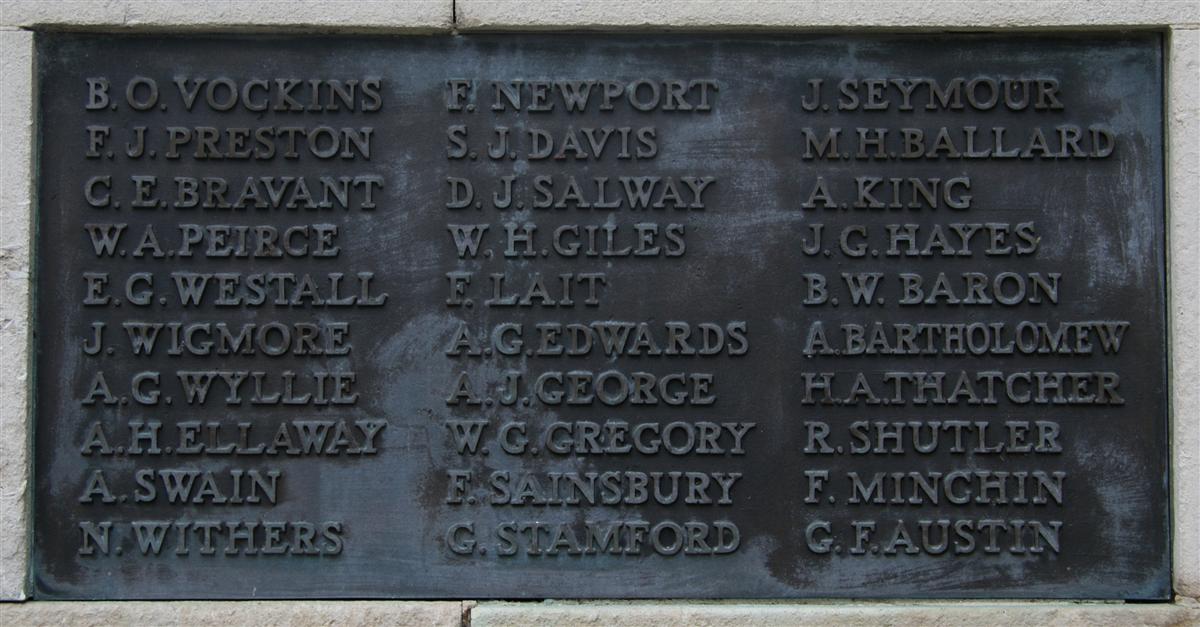George Frederick (Dick) Austin
2nd Lieutenant George Frederick Austin, 6th Battalion, Royal Berkshire Regiment
 Dick Austin. |
George was born in Eaton Hastings (then in Berkshire, now in Oxfordshire) on 15 February 1884, the son of George Austin and his wife Mary (née Hutchins). Perhaps to avoid confusion with his father young George became known as 'Dick'. George senior, a farmer’s son from Broad Hinton in Wiltshire, had tried a few occupations: in 1881 he gave his occupation as 'retired farmer' (aged 31), in 1891 he was a brewer's traveller, settling in Newbury by 1901 as a 'stationery traveller'. In Newbury they lived first in Queen’s Road (2 Queen’s Arms Villas) from c1895 then in 1903 moved to a newly built house called ‘Wroughton’ in Porchester Road.
Dick was educated at the British School in Newbury before attending Skerry's Civil Service College in London. Skerry’s specialised in training students to pass Civil Service entrance examinations. At college Dick achieved a City and Guilds (1st Class) certificate in Telegraphy and a Board of Education (1st Class) certificate in Electricity and Magnetism. These qualifications were ideally suited to get him a job with the Post Office as a Sorting Clerk and Telegraphist back home in Newbury.
On 26 August 1913 Dick volunteered for service with the Royal Engineers Signal Service Special Reserve (Category B). As a trained telegraphist his skills would have been of instant value to the Army; he was 'posted' to the South Midland Royal Engineers. As a Special Reservist Dick would have continued to work at the Post Office with some part-time soldiering, drills, etc in his spare time. Sapper Austin attended his first annual training session of two weeks with a regular unit from 13 September 1913. Before he could attend a second annual training session war intervened. On 4 August 1914 war was declared, the following day George was mobilised, three days later, on 8 August he found himself in France, arriving on the same boat as the Commander in Chief of the British Expeditionary Force, Field Marshall Sir John French.
Dick’s signal unit was attached to II Corps HQ, so he would have experienced the retreat from Mons to the River Marne, where the BEF turned and went on the offensive. The subsequent German retreat ended along a line that was to become all too familiar over the following four years. In the following years II Corps saw action along the front from Messines (at the south end of the Ypres salient) to the Aisne. Corps HQ was a lot safer posting than front line duties but he would have been involved at the heart of an organisation of 50,000 or more men. Dick was promoted, first to Lance Corporal (15 December 1915) then Corporal (13 March 1916) before being invalided home on 3 August 1916 with an ulcer on his left eye. After a week in hospital and a period of convalescence, including home service at the RE Signals Depots at Fenny Stratford and Hitchin, Dick returned to France in November 1916 taking the precaution of writing a will while on the train to Southampton and posting it to a friend at Hitchin asking him to hand it in to the Document Section. Sadly his return to France was followed within a few weeks by the death of his father, George, who died on 11 December 1916 and was buried in Newtown Road Cemetery.
It was not long before he returned home again, this time to attend Officer Cadet School - No 20 Officer Cadet Battalion, at Haig Hutments in Crookham, Hants on 16 January 1917. His application for a commission was supported by a character references from local MP, Sir William Mount (great grandfather of David Cameron) and the Revd Alfred Baines, Vicar of St John the Evangelist, Newbury. How a Post Office clerk was well enough known to Sir William Mount to get a reference from him is a mystery.
In May 1917 Dick passed out from officer training and was commissioned as a 2nd Lieutenant in the Royal Berkshire Regiment (Gazetted 21 June 1917). He had applied for a commission in the infantry, specifying the Royal Berks as his choice of regiment – but, almost immediately, there was a request for his transfer back to the Royal Engineers. It is not clear whether this came from Dick or from his old unit – but it was turned down by the Royal Berks: “We regret this officer is not available. He has been ordered overseas as a replacement.”
Dick arrived back in France on 30 May and joined the 6th Battalion, Royal Berks. His experience made him an obvious choice to be the battalion signalling officer.
On 9 October 1917 the 6th Royal Berkshires were temporarily attached to 55th Brigade to support and attack on Poelcappelle during the 3rd Battle of Ypres. The next day they were in Cane Trench preparing for an assault the following day. Dick's job was to lay out tapes to guide the troops to the point from which they would attack - and as far beyond that as practicable (many attacks failed when troops, often whole battalions, missed their way). While he and his men were engaged in this dangerous task (they could not do the job and take shelter from shelling) Dick’s luck ran out; he was the battalion’s only casualty of the day, a victim of shellfire. The daily entry for 10 October in the battalion war diary was short: Belgium, Cane Trench. In support. Day spent in preparing for operations 2/Lt GF Austin killed.
Over the next few days the 6th Royal Berkshires were engaged in an ultimately pointless attack taking very heavy casualties. The depleted battalion never went into action again and was disbanded the following month, the men being shared out amongst the 1st, 2nd and 8th Battalions of the Regiment.
The local paper reported the news of Dick’s death a couple of weeks after the event:
Newbury Weekly News, 25 Oct 1917, p8 – Local War Notes
It is reported that Second-Lieutenant George Frederick (Dick) Austin, Royal Berks, of Newbury, was killed in action on October 11. His many Newbury friends have been greatly grieved by the sad news.
Followed by a more detailed report the following week:
Newbury Weekly News, 1 Nov 1917, p8 – Local War Notes
2nd Lieut G F (Dick) Austin, who was killed in action, October 11th, was the only son of the late Mr George Austin and Mrs Mary Austin, Wroughton, Porchester-road, Newbury, and grandson of the late Mr Mathew Austin, Northbourne Farm, Broad Hinton, Wilts. On the outbreak of war he at once went to France in the Signal Section of the Royal Engineers going out on the same boat as General French, and taking part in the retreat from Mons. He served continuously in France until July 1916, when he was in hospital with injury to his eyes. He remained in England until November, when he was made Sergt, and returned to France, taking over a draft. In January, 1917, he was sent home to take a commission, and joined the Officers Cadet Battalion at Crookham, near Aldershot. Passing his examination, he was gazetted May 30th to the Royal Berks, going back to France on July 14th. Following is an extract from a fellow officer's letter:- “Your son had only recently taken over the duties of Signalling Officer, and showed very great promise in his work. He was greatly respected and beloved by all his fellow officers and men, and is now greatly missed by us all. We all have one consolation of knowing that he died a gallant and noble death for a most excellent cause.”
Dick's body was buried near to where he fell, in plot V.A.41 at Bard Cottage Cemetery in Belgium.
The story does not end with Dick’s death. His sister Sarah took on the responsibility of sorting out his affairs. She was aware that Dick had written a will just before he left for France for the last time and had lodged it with Cox’s bank in London. However, Cox’s could find no trace of such a will. Sarah then wrote to the War Office asking for a copy of an earlier will, written as he left for France in late 1916. In successive letters Sarah became increasingly upset at the War Office’s lack of response. In December she did finally get a response from the Royal Engineers Records in Chatham – admitting that they did have the will – and refusing to send it to her without instruction from the War Office.
The War Office’s lack of response to Sarah did not mean that they were doing nothing – Sarah’s letters stirred them up into a veritable tirade of memos. At the end of January they finally sent a copy of the simple will, which left everything to his mother. It was too late to do his mother any good, she died in December; a death attributed by Sarah to be a direct result of Dick’s death. Sarah now had an additional problem as she needed to sort out Dick’s estate before she could sort out her mother’s.

Dick Austin's name on Newbury War Memorial (bottom right) |
Mary Austin, Dick’s mother, was buried with her husband in Newtown Road Cemetery, Newbury, on 27 November 1917. Sarah also had the stonemason add Dick’s name to the gravestone on his parent’s grave.
In addition to the memorial on his parent’s grave, Dick is remembered (as

Find a memorial :
| Died this day: | |
| 02 March 1917 | |
| Frederick Hughes | |
| Yattendon |

Like this site? Show your appreciation through a donation to a great charity.